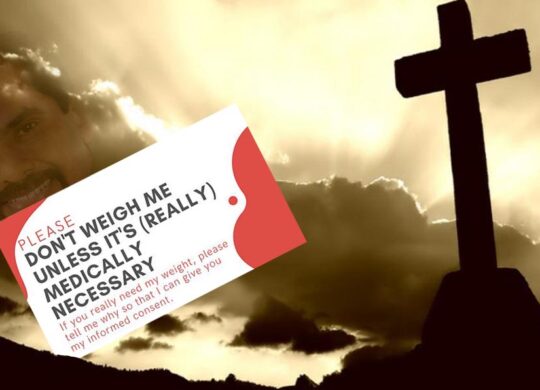Weighed?

For those struggling with body image issues, even going to the doctor can be stressful, it appears.
Checking your weight at your physician’s office is standard practice (but not for dermatologists!). So if you have to hop on to a scale in the middle of a busy hallway at your doctor’s, well, that can be embarrassing for the self-conscious. And apparently that results in weight-worried patients avoiding health checkups altogether.
So More-Love.org has created a solution. “Don’t Weigh Me” cards, that the stressed out individual can hand to the doctor.
They read:
Please don’t weigh me unless it’s (really) medically necessary. If you really need my weight, please tell me why so that I can give you my informed consent.”
(They also have “Don’t Talk About My Child’s Weight” cards.)
More-Love:
Because we live in a fatphobic society, being weighed and talking about weight causes feelings of stress and shame for many people. We want to support you in requesting healthcare that is free of weight bias. We don’t have to automatically step on the scale just because someone asks us to.”
This is true.
Our ’Don’t Weigh Me’ cards are a polite and respectful way to assert your preference at the doctor’s office and seek informed consent if weight is deemed necessary for care and treatment. You can keep them in your wallet or pocket to remind yourself that it’s OK to not automatically step on the scale when asked.”
Agreed Jennifer Gaudiani, a Denver-based physician who treats eating disorders:
It is entirely correct that after age 18, most people do not need to be weighed at the doctor’s office. Of course, young children need to have weight and height monitored to make sure growth is proceeding properly. Pregnant people also need to have weights followed―although they don’t need to have the weights revealed or discussed―to be sure baby is getting what baby needs.”
But outside of exceptions like these, Gaudiani said she’s confident that “90%” of weigh-ins taken at medical offices are entirely unnecessary.
There are even doctors who have adopted a Health at Every Size, or HAES, approach to public health. HAES-aligned health care providers seek to deemphasize weight loss as a health goal while reducing stigma toward larger bodies in the medical field.
If you were wondering where I was going with all this and expecting a diatribe on high BMI and obesity, you wonder wrongly.
But I do want to sneak in the notion of another kind of “weight.” God’s weight! Yes, God’s.
In Hebrew, the word for “glory,” is kavod, which describes heavy things/people.
Eli fell off the seat backward beside the gate, and his neck was broken and he died,
for he was old and heavy [kaved].
1 Samuel 4:18
And the heaviest organ in the body, the liver (should be the skin, but I’ll let that pass):
“You shall take all the fat that covers … the lobe of the liver [kaved], …
and offer them up in smoke on the altar.”
Exodus 29:13
Even wealth.
“He has made all this wealth [kavod].”
Genesis 31:1
It’s a short step from this to the figurative sense of “heavy” as being profound, important, and substantial. And, when it relates to God, it indicates his glory!
The heavens declare the glory [kavod] of God.
Psalm 19:1
Yup, not hiding it or shrinking away from it, but proclaiming the “weight” of God.
And one day …
All nations whom You have made,
they will come and worship before Your face, Lord,
and they will glorify [kaved] Your name.
Psalm 86:9
Amen!
SOURCES:
Huffington Post; CNN; More-Love











 Abe Kuruvilla is the Carl E. Bates Professor of Christian Preaching at The Southern Baptist Theological Seminary (Louisville, KY), and a dermatologist in private practice. His passion is to explore, explain, and exemplify preaching.
Abe Kuruvilla is the Carl E. Bates Professor of Christian Preaching at The Southern Baptist Theological Seminary (Louisville, KY), and a dermatologist in private practice. His passion is to explore, explain, and exemplify preaching.